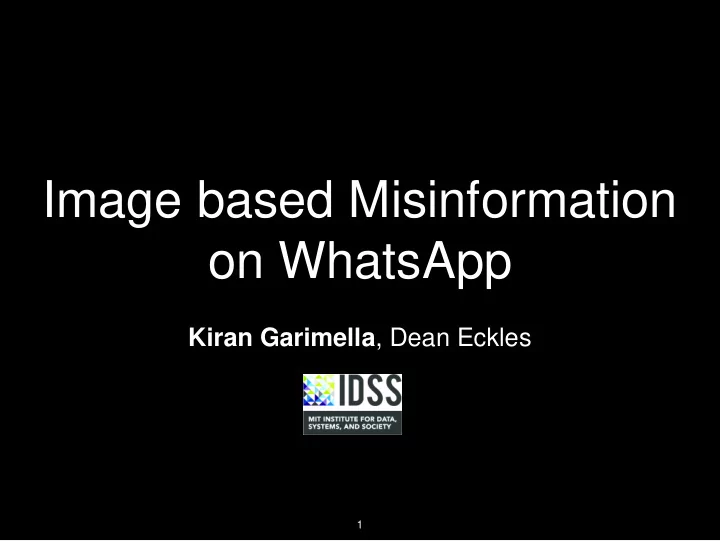

Image based Misinformation on WhatsApp Kiran Garimella , Dean Eckles 1
WhatsApp • Peer to peer messaging platform • 1.5 Billion monthly active users • Multimedia heavy – roughly 50% is images and video • End-to-end encrypted
Image based misinformation • Much more powerful! • Almost no large scale studies. • Closed platforms are important! • Sense of intimacy and trust
Dataset • WhatsApp • Over 6,000 public political groups from India • ~2 million images • Over 6 months starting December 2018
Fact checked images • Fact checking websites • ~450 images • Manual annotation • 3 journalists • ~400 images
100 200 300 400 500 600 700 800 900 07/01/19 0 14/01/19 When were these images 21/01/19 28/01/19 04/02/19 11/02/19 18/02/19 25/02/19 Number of times fake images were shared 04/03/19 shared? 11/03/19 18/03/19 Mostly during the India-Pakistan 25/03/19 01/04/19 08/04/19 15/04/19 conflict! 22/04/19 29/04/19 06/05/19 13/05/19 20/05/19 27/05/19 03/06/19 10/06/19
Primary Categories • Images taken out of context (~30%)
Out of context images “Cheap fakes"
Primary Categories • Images taken out of context (~30%) • Photoshopping (~20%)
Photoshopped images
Primary Categories • Images taken out of context (~30%) • Photoshopping (~20%) • False statistics and quotes (~10%)
Fake Quotes/Stats
Primary Categories • Images taken out of context (~30%) • Photoshopping (~20%) • False statistics and quotes (~10%) • Other
Misinformation topics • Primarily political • Memes/Nationalism/Religion • Rumors/Urban legends • Feel good stuff • Health (roughly 15%!)
Why is this important? • Automated fact checking • Out of context images • Photoshopped • Fake quotes/stats
Why are they sharing these? • Caring about others • Low cost of forwarding (much easier than fact checking) • Lack of awareness • Personal belief in these networks • Malicious intent? (hard to identify) • Prejudice and ideology rather than out of ignorance or digital illiteracy.
What could be done? • Only central authorities can make a difference! • Need to have a common repository
Summary • Categorized image misinformation • Public groups • The same categorization generalizes across countries and platforms
Thank you! @gvrkiran garimell@mit.edu 25
Recommend
More recommend